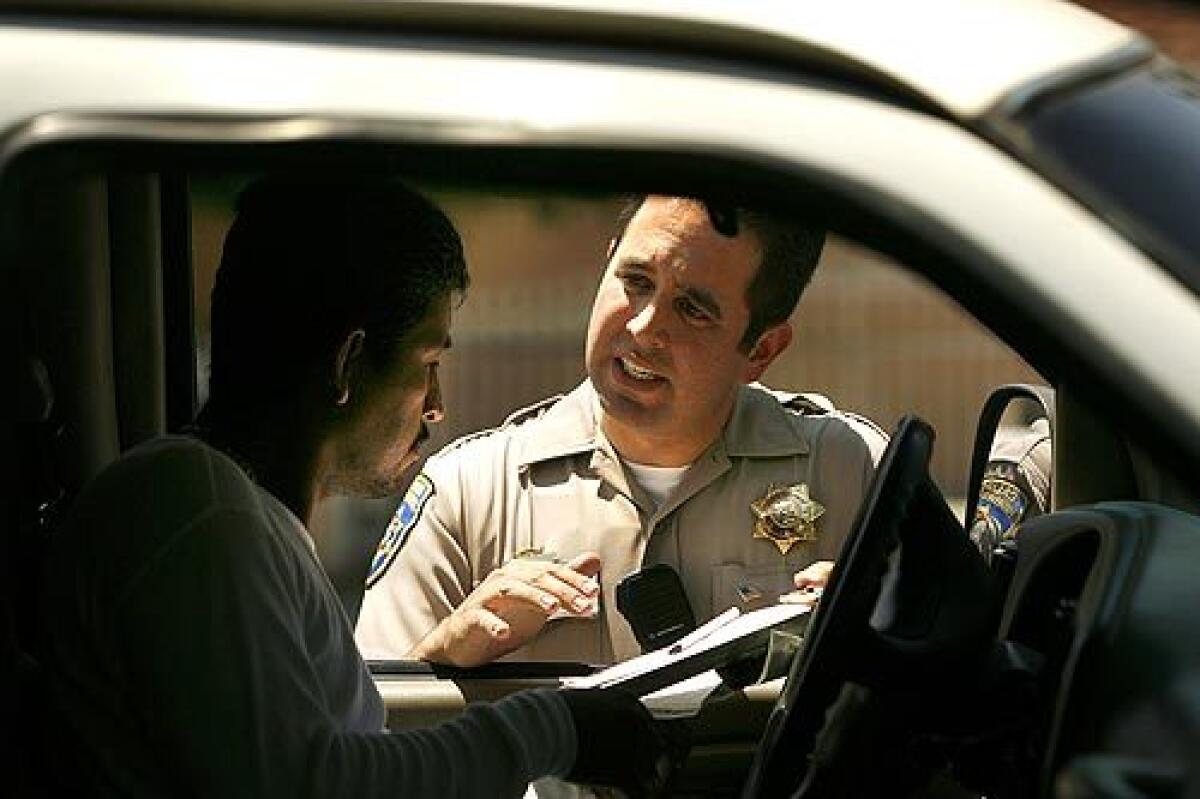CHP station surprised by cellphone law compliance

- Share via
As he waited in his cruiser near a 605 Freeway offramp in Santa Fe Springs, California Highway Patrol Officer Joe Zizi swore that the stretch of road had been a “cellphone mecca” just one day before.
Zizi was expecting the 14 officers operating from his station to have a ticket field day on the first day of a law requiring drivers to use hands-free devices to make cellphone calls. But driver after driver either wore an earpiece or resisted talking on a cellphone.
Then Adolfo Lomeli, 39, rolled by, cellphone to his ear. Zizi turned on his lights, and minutes later Lomeli was signing his ticket.
“I was just putting my phone on speaker,” said the Whittier resident, telling Zizi that he hadn’t heard about the new law. Zizi wasn’t buying it.
“It surprises me that someone still says they don’t know it was today,” the officer said later. “People have had two years to prepare for this.”
But law enforcement officials said the real surprise was that so many motorists, who have turned driving while in the grips of a cellphone conversation into yet another Southern California cliche, were playing by the new rules.
“The early anecdotal information we’re hearing is that for the most part, we’re noticing a lot more headsets and Bluetooths out there,” said Tom Marshall, a CHP spokesman, though he added that it was too early for ticketing statistics.
Zizi’s experience seemed to bear Marshall’s information out. Despite the large number of officers, the CHP issued only 18 citations for improper cellphone use from 5 a.m. to 3:30 p.m. out of the Santa Fe Springs station, a number he called “very minimal.” (Officers gave out a total of about 70 tickets during that period for all traffic offenses.)
Actually, Zizi said, catching cellphone scofflaws proved difficult.
Drivers scratch their head or rest their elbow by the window, he said. Some even hold their wireless headsets as they would a cellphone. In one case earlier in the day, Zizi let a driver go with a warning because he wasn’t sure whether a violation actually occurred.
“I didn’t get a clear look to see if it was a cellphone or an earpiece,” Zizi said. “I gave the benefit of the doubt.”
While Zizi was ticketing one scofflaw, a driver on his cellphone -- without the earpiece -- zoomed by, waving in defiance.
Heather Smith, 32, of Woodland Hills was fuming Tuesday afternoon after she failed to get the benefit of the doubt. Smith said she was driving in Monrovia and talking on her Bluetooth device when a police cruiser stopped her. She said she assumed she was being stopped for another violation.
She said the officer told her he saw her press a cellphone to her ear. Smith told him her phone was in her pocket.
“He said, ‘No, you put a cellphone to your head,’ ” Smith said. “I said, ‘So I’ve got to waste my time and go to court because you obviously can’t see I have a Bluetooth in my ear?’ ”
She said she told him she refused to sign the ticket until the officer told her he would have to take her into custody if she did not. Smith said that she went to the Monrovia police station to complain and that a supervisor told her to bring a receipt for her Bluetooth when she went to court.
Smith said she had been so cautious about not getting cited because of the new law that she made sure not to dial her phone, but to use a voice command feature. To the citing officer’s credit, Smith said, he was courteous -- even if she thought he was clueless in this case.
“He was much more polite than I was,” she said.
Monrovia police officials were not available to comment on the case, but in general, officers have been given wide discretion in how aggressively they enforce the law. The CHP has vowed the most rigorous enforcement, while LAPD officials have said that at first they will err on the side of giving warnings rather than issuing tickets.
Although the base fine is $20, a first offense can run from $73 to $93 after penalty assessments. A subsequent offense, with a base fine of $50, could be as much as $210, Zizi said.
For drivers under 18, forbidden by law from using either cellphones or hands-free devices while driving, those fines double, Zizi said. One driver told Zizi he was calling the police with an emergency -- the only type of call the law allows from a driver without a hands-free device. Zizi said he asked the driver to show him the cellphone. The log showed no call to 911. Even though officers were on the lookout for cellphone violations, he said their primary concern was still speeding and safety belt offenses.
“The major crashes at this station are caused by speeding,” he said.
The cellphone law only “gives another reason for officers to pull someone over to prevent crashes.”
At the Montebello Town Center, Michael Ornelas, 19, said he didn’t want to give officers any excuse to stop him. He worked at the Raider Image, a store that sells athletic wear devoted to the Oakland Raiders.
He said many of his friends are defying the law. “Some of them don’t even wear seat belts,” Ornelas said. But despite his favorite team’s bad-boy image, Ornelas said he preferred to stay on the right side of the law.
“My girlfriend bought me a Bluetooth for $84.99 at Radio Shack,” he said. “I don’t really like the whole flashing light in my ear . . . but hands free, you can’t be safer than that.”
More to Read
Sign up for Essential California
The most important California stories and recommendations in your inbox every morning.
You may occasionally receive promotional content from the Los Angeles Times.










